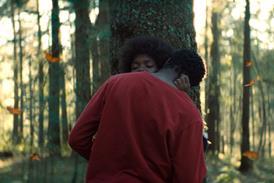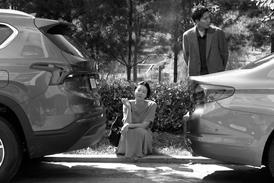Didier Ouenangare and Bassek Ba Kobhio's slight tale has been billed as the first ever Central African film, says Lee Marshall
Dirs: Didier Ouenangare, Bassek Ba Kobhio. Central African Republic-Cameroon-Gabon. 2003. 91mins
More a consciousness-raising gesture than a piece of cinema, pure and simple, The Silence Of The Forest is a slight, innocent tale of a French-educated African intellectual's misguided attempt to combat his country's black-on-black racism and help an oppressed pygmy tribe. Still, the film, which premiered in Directors' Fortnight at Cannes, is an admirable result for what is being billed as the first ever Central African film. So few full-length features are greenlit in sub-Saharan Africa that co-director Ouenangare had to wait until he was 50 to make his debut. The film's prospects of overseas distribution will probably be limited to France, but it should tour Francophone Africa inside and outside of the standard exhibition channels, especially if its obvious didactic intent is translated into showings for schools and villages. Big box-office results at home are sadly unlikely: the single cinema in the Central African Republic has, apparently, closed down.
The film tells the story of Gonaba, an intellectual who returns to his homeland with the dream of improving living conditions and educational standards. After 10 years he has risen to become Inspector of Schools, but is disillusioned, and has returned to see the truth of the words spoken by a cynical boatman on his return: 'In this country, all we have is manioc for breakfast, manioc for lunch, manioc for dinner and a new set of ministers every month.'
Invited to an official reception for party cadres, Gonaba takes the side of the pygmies who have been hired to dance for the 'big men' as if they were circus entertainers. Though a romance with a beautiful bar owner provides some distraction, Gonaba decides that his destiny lies with the pygmies in the forest: he has ambitious plans to better their lot and encourage them to rebel against their oppressors.
But in the end, when he finally does make it to a pygmy village, it is Gonaba who is educated - in the lore, traditions and hunting skills of his hosts. Gonaba's jungle debriefing is managed as efficiently as one might expect; in fact, his gradual, grudging acceptance into the tribe is the stuff of any number of Hollywood Shangri-la scripts.
Pierre-Olivier Larrieu's camerawork makes the most of the lush jungle greens, red earth hues and firelight on black faces, and Manu Dibango's Afrobeat soundtrack is mixed with tribal music (including an a cappella funeral chant that sounds like it might have been composed by Philip Glass), and an urban band sequence that keeps toes tapping.
The most interesting thing about the film, though - apart from its ethnological value as a rare glimpse of the life and customs of the Koungou pygmies - remains Gonaba's misguided attempt to apply Western canons of liberty, equality and fraternity to a jungle community. He is desperate to be blacker than his 'white man' colleagues in government, but in the end, it is Gonaba's girlfriend who sums up his doomed mission when she tells him, admiringly, 'You're a black man but you behave like a white man - you're my ideal'.
Prod co: Les Films Terre Africaine
Co-prod: Ecrans Noirs, Centre National du Cinema
Int'l sales: Mercure International
Prods: Abderrahmane Sissako, Guillaume de Seille
Scr: Didier Ouenangare, Bassek ba Kobhio, Marcel Beaulieu, from the novel by Etienne Goyemide
Cinematography: Pierre-Olivier Larrieu
Ed: Joseph Licide
Prod des: Heather Cameron
Music: Manu Dibango
Main cast: Eriq Ebouaney, Sonia Zembourou, Nadege Beausson-Diagne, Philippe Maury



















No comments yet